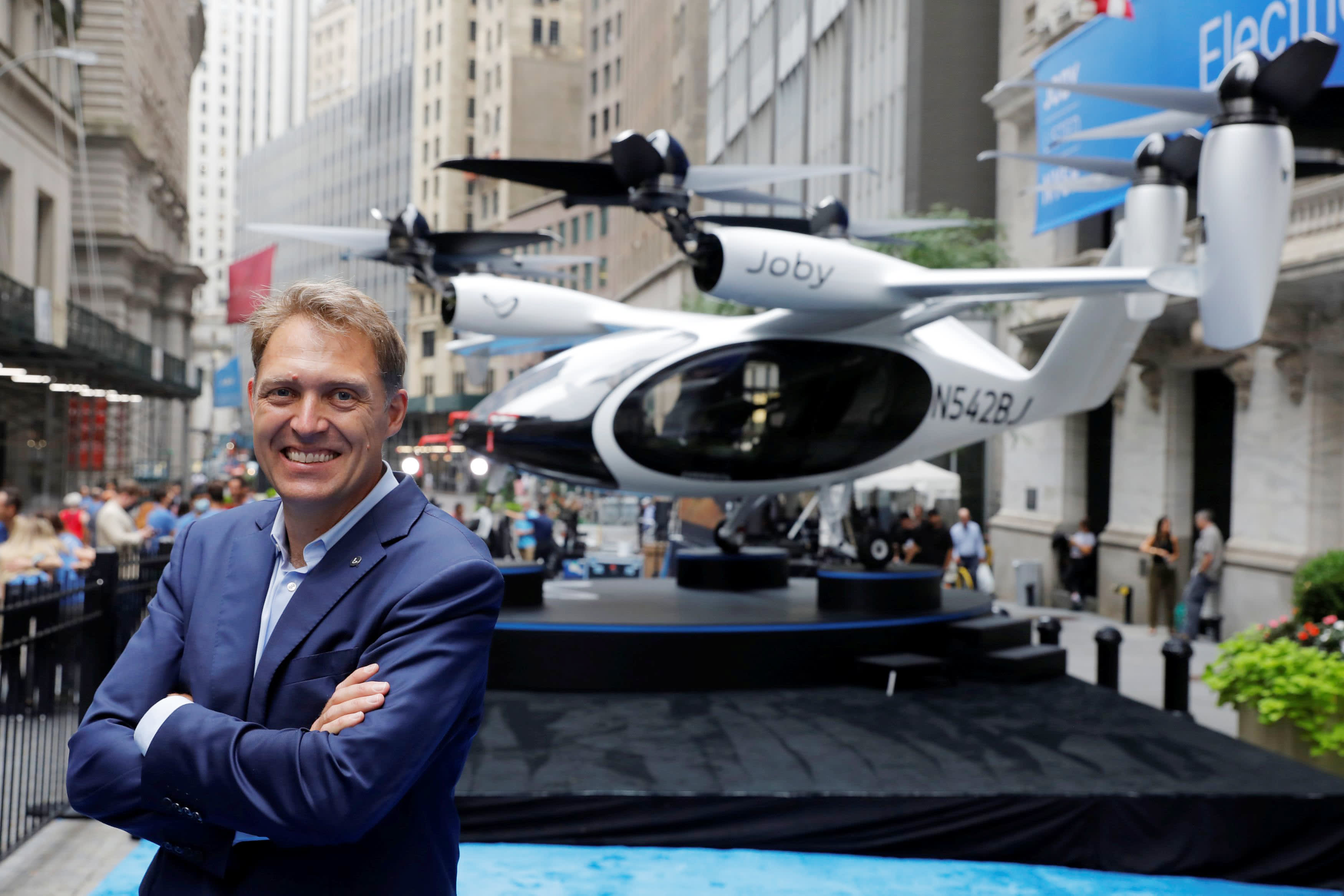
Shares of electric aircraft maker Joby Aviation surged more than 20% after opening at $10.62 in their first day of trading on the New York Stock Exchange after the company’s SPAC merger.
Founded in 2009 by CEO JoeBen Bevirt, the start-up wants to make air travel cleaner and quieter, and is offering an electric alternative to traditional planes or helicopters for short hops.
The company aims to bring its electric vertical takeoff and landing aircraft, known in the industry as an eVTOL, into service in 2024. The company brought one of its aircraft to park in front of the New York Stock Exchange on Wednesday to mark the occasion. According to the company, its eVTOL can transport four passengers and a pilot, flying up to 150 miles on a single charge with a cruising speed of 200 mph.
Joby Aviation went public by merging with a blank-check company called Reinvent Technology Partners, which is run by LinkedIn co-founder Reid Hoffman and Zynga founder Mark Pincus. While the shares were previously listed under the ticker RTP for the special purpose acquisition company, Joby Aviation now trades under JOBY and JOBY WS.
The SPAC deal will bring Joby more than $1 billion, which the company intends to use to earn Federal Aviation Administration certifications, build electric aircraft and make its air taxi service operational in the U.S.
Bonny Simi, a three-decade pilot and former president of the JetBlue venture arm, heads Joby’s air operations and is leading its efforts to win FAA certification of its aircraft.
While the company’s primary revenue will come from operating air taxis, it’s also figuring out how to generate and sell environmental regulatory credits to other aviation businesses that will need to offset their carbon emissions.
Joby Aviation founder JoeBen Bevirt poses next to a Joby Aviation Air Taxi ahead of their listing at the New York Stock Exchange (NYSE) in Manhattan, New York City, U.S., August 11, 2021.
Andrew Kelly | Reuters
Commercial aviation contributes more than 2% of global carbon emissions, according to the International Council on Clean Transportation.
Like Joby, other eVTOL competitors have drawn investment from U.S. airlines, as they scramble to lower their emissions.
For example, in February United Airlines joined other investors in backing Archer, and in June American Airlines announced it will invest in Vertical Aerospace, which said it has preorders for up to 1,000 eVTOL aircraft. American said it will be a launch customer along with aircraft leasing firm Avalon. Virgin Atlantic had preorder options.
German eVTOL maker Lilium, and Archer, have both also pursued SPAC deals.
Unlike other manufacturers, Joby intends to operate its own air taxi service, setting up “skyports” and charging stations for its planes within and beyond the U.S.
Joby Executive Chairman Paul Sciarra told CNBC it may seem strange to be the manufacturer and operator of eVTOLs, but Boeing once owned United. “This lets us bear hug the safety of early operations,” he said. “We get to pick the routes, we get to pick the pilots, we get to pick the take-off and landing locations.”
Speaking with CNBC’s Phil Lebeau in New York on Wednesday, Bevirt said that while Joby will launch its air taxis as a piloted service, “Over time, we will add incremental levels of pilot assist and full autonomy, similar to the way you see autopilot rolling out in automobiles.”
Before its SPAC deal with RTP, Joby had also raised funding from investors including Uber, JetBlue Technology Ventures, and early Tesla backers Toyota and Baillie Gifford. In the company’s earliest days, Bevirt funded Joby with some of his earnings from inventing the GorillaPod, a flexible camera tripod for smartphones.
In a press statement ahead of Joby’s market debut, Hoffman said, Joby was “‘Tesla meets Uber in the air.'”
This article was originally published on CNBC

